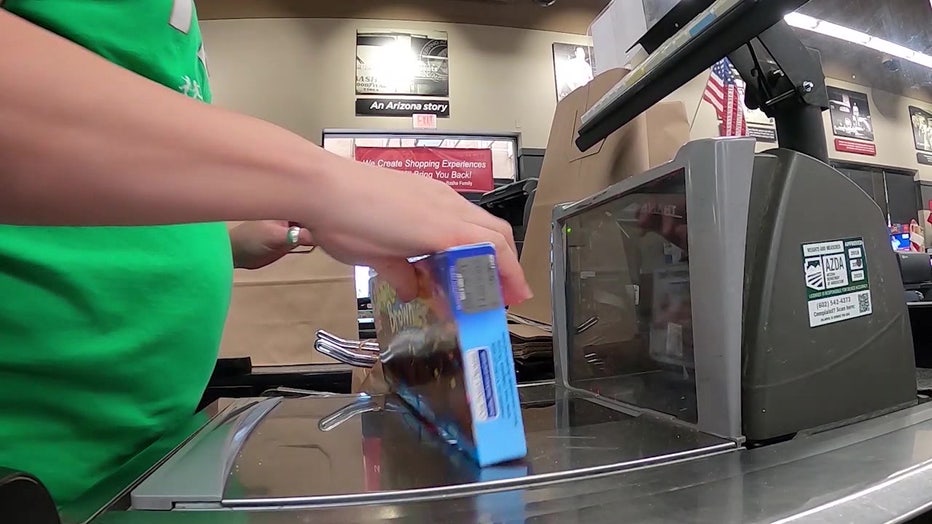Vetoed Senate Bill 1063 aims to ban Arizona cities from levying grocery taxes: here's what you should know

(Earlier Video) Some say Arizona bill to ban taxes on groceries could hurt people
If approved, Arizona cities and towns will be banned from levying taxes on food meant to be eaten at home. Some say the ban will impact municipal budgets. FOX 10's Nicole Garcia reports.
PHOENIX - Governor Katie Hobbs has vetoed a bill that supporters say will groceries more affordable for some residents by eliminating a tax on food items.
Here's what you should know about Senate Bill 1063, also known as House Bill 2061.
What is the bill all about?
The bill seeks to amend Section 42-6015 of the Arizona Revised Statutes regarding city taxes.
Under the proposed bill, cities, towns, or other taxing jurisdictions in Arizona cannot levy "transaction privilege, sales, use, franchise or other similar tax or fee, however denominated," on the sale of food items, as defined under law, that are meant for human consumption at home.
The bill passed 6-4 in a State House Committee, with all Republicans voting yes.
What's the current law on such taxes?
Under current law, food items intended for human consumptions at home can be taxed, so long as the tax is "applied uniformly with respect to all food, and an additional tax or fee differential is not assessed or applied with respect to any specific food item."
Arizona has no grocery taxes on the state level, according to a fiscal note posted on the Arizona State Legislature's website
Are there Arizona cities that tax food items?
While the state, along with most large cities within Arizona, do not tax food or household items, there are some cities, such as Cave Creek Gilbert, Scottsdale and Wickenburg, that do have a food tax.
Such food taxes range between 1.5% to 3%. Shoppers in Cave Creek, for instance, pay a 3% tax on food items. In Scottsdale, the tax there is under 2%.
In all, the fiscal note posted on the Arizona State Legislature's website states that 65 of Arizona's 91 incorporated towns and cities taxed food for home consumption in the 2022 Fiscal Year.
What are politicians saying about the bill?
State Rep. Leo Biasiucci, who introduced the bill, said in a tweet that "Arizonans shouldn't have to pay taxes to put food on the table for their families."
Democrats in the Arizona State Legislature spoke out against a bill. On their Twitter page, they say grocery taxes make up a big portion of budgets for towns like Taylor, Springerville, and Benson.
How will the bill affect the budgets of some Arizona towns?
According to the fiscal note posted on the Arizona State Legislature's Website, proceeds from grocery taxes levied in Arizona totaled $158.3 million for the 2022 Fiscal Year.
"We estimate that HB 2061 would reduce municipal TPT by up to $182.9 million in FY 2024, $189.3 million in FY 2025, and $195.6 million in FY 2026," read a portion of the fiscal note.
The state budget will not be affected because Arizona has no grocery taxes on the state level.
Why did Gov. Hobbs veto the bill?
In a letter to State Senate President Warren Petersen, Gov. Hobbs wrote that she has heard from dozens of local leaders about the impact the bill would have on cities and towns.
"From potential cuts to services-including public safety-to increased property taxes, it is clear that this bill doesn't actually eliminate costs for our residents. It simply moves those costs around," read a portion of the letter.
In the letter, Gov. Hobbs also notes that the bill won't take effect for more than two years, and does nothing for Arizonans on SNAP and WIC benefits, as they are already exempt from the tax.
What about ordinary Arizonans? What are they saying about the bill?
Grocery shoppers we spoke with prior to the bill's passage and veto had mixed reactions.
"The tax has to come from somewhere. We’d rather have it on retail goods," said Diana Gorsche of Cave Creek.
"I think I'd rather pay the 3% grocery tax, because property taxes are something more permanent, whereas food taxes can vary," said John Gorsche of Cave Creek.
On Twitter, some users also spoke out against State Rep. Biasiucci over the bill.
"Firefighters and police officers need to be paid. Stop with this performative nonsense. Do your job," tweeted a user named ‘Judy,’ who claims to be a retired junior high science teacher in Arizona.
Read More Arizona Explainer Stories
- Phoenix Police asking for public comment on its use of force policy: What you should know about their rules
- The Super Bowl and Arizona: What you should know about the state's experience with the big game
- Phoenix high school district holds listening sessions as they reconsider police presence on campus


